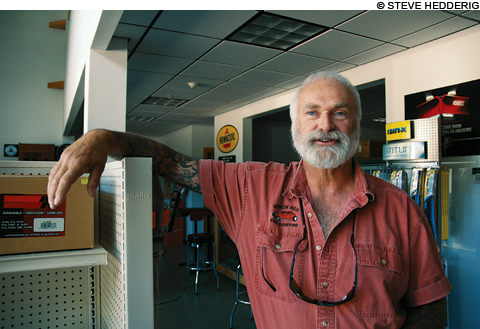On the campaign trail, Republican presidential nominee Mitt Romney touts his work with Bain Capital as evidence he knows how to fix the struggling American economy. He also profits heavily from the company: According to reports in the New York Times and from the Associated Press, Romney received between $1.5 million and $6.2 million in income from his Bain holdings in 2011 alone, and is expected to continue earning from those investments into the future. (All his holdings are in a blind trust outside his direct control.)Though he doesn't go into specifics about how his company works, Bain Capital is showing its stripes in a battle in Warren, Maine, that has lasted the past two years, and counting.
Rather than demonstrating Bain building businesses, communities, and society, the story of that battle reveals the strategies, techniques, and tactics Bain uses to force its goals upon unwilling, and sometimes unsuspecting, regular people. And results from similar assaults on other communities demonstrate the profit-at-any-cost mentality that has laid waste to lives and communities — a far cry from Romney's campaign-trail tales of success.
The company's unyielding efforts to open a methadone clinic in Warren have turned the town into a costly battleground, making enemies of friends and neighbors, racking up legal fees, and marking a local businessman as public enemy number one in the community he has always called home.
The first part of the story is a problem that has swept Maine and much of rural America: addiction to prescription drugs that have been diverted from their intended medical use into recreationally abused substances.
Maine has the highest rate of people seeking treatment for opiate addiction in the country, at eight times the national average, according to a 2010 Substance Abuse and Mental Health Services Administration report.
In 1998, Maine was the only state in which non-heroin opioids were the primary drug of abuse in treatment admissions. Between 1995 and 2001, Maine patients treated for opiate abuse more than quadrupled.
In 2011 Maine Attorney General Bill Schneider called a prescription-drug abuse summit to address drug death rates (86 percent of Maine's are due to prescription drugs), rising rates of pharmacy robberies (from 2 in 2008 to 24 in 2011 and 24 so far this year), and crime (Public Safety Commissioner John E. Morris called prescription drugs the "driving factor" in Maine's largest overall crime spike since 1975).
In February, Republican Governor Paul LePage created the Maine Prescription Drug Abuse Task Force. Its first report is due this week. One member of the group is Melissia Petro, a lobbyist for Purdue Pharma, the maker of oxycodone (brand-name OxyContin), which was released in the mid-'90s and is now the most widely abused prescription drug in Maine. In 2009, oxycodone surpassed methadone as the most common single drug mentioned on death certificates in Maine, according to a University of Maine study.

A SMALL-TOWN BATTLEGROUND Bob Emery Jr. (above) has become the local face of Bain Capital-owned CRC Health Corporation. |
GROWTH OPPORTUNITY
In 2006, Bain Capital bought CRC Health Corporation for $723 million and proceeded to give CRC, now the nation's largest provider of drug treatment services, the royal private equity treatment.